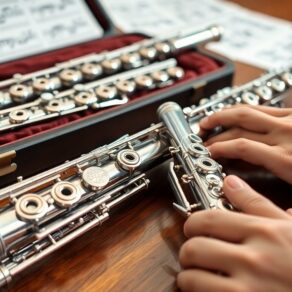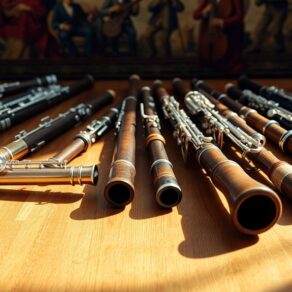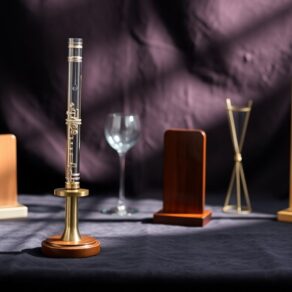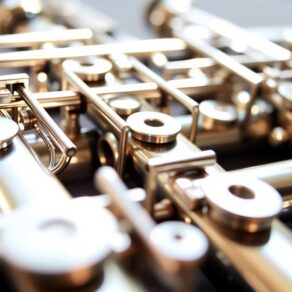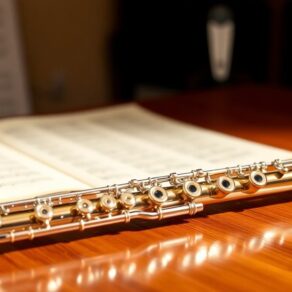Choosing versatile instruments is essential for jazz musicians like you who want to enrich their sound and perform across various styles. Instruments such as the flute offer a unique voice with its light, airy tone, enabling intricate improvisation and emotional expression. When selecting flutes, consider brands like Yamaha or Powell for their superior quality and tonal warmth. Remember to balance budget with performance needs, ensuring you pick an instrument that resonates with your style. With the right choices, you'll open doors to collaboration and experimentation that enhance your musical journey. More insights await on how to elevate your instrument selection.
Key Takeaways
- Select instruments that enhance dynamic expression and allow for genre traversal, such as flutes and brass.
- Look for versatile features like agile playability, which facilitates intricate improvisation and creative experimentation.
- Prioritize sound quality; materials like silver or gold provide warmth and tonal richness essential for jazz.
- Consider the instrument's design, such as open holes and pointed key mechanisms, which improve control and responsiveness.
- Factor in budget and maintenance; balance quality with affordability to ensure long-term satisfaction and performance.
Importance of Versatile Instruments
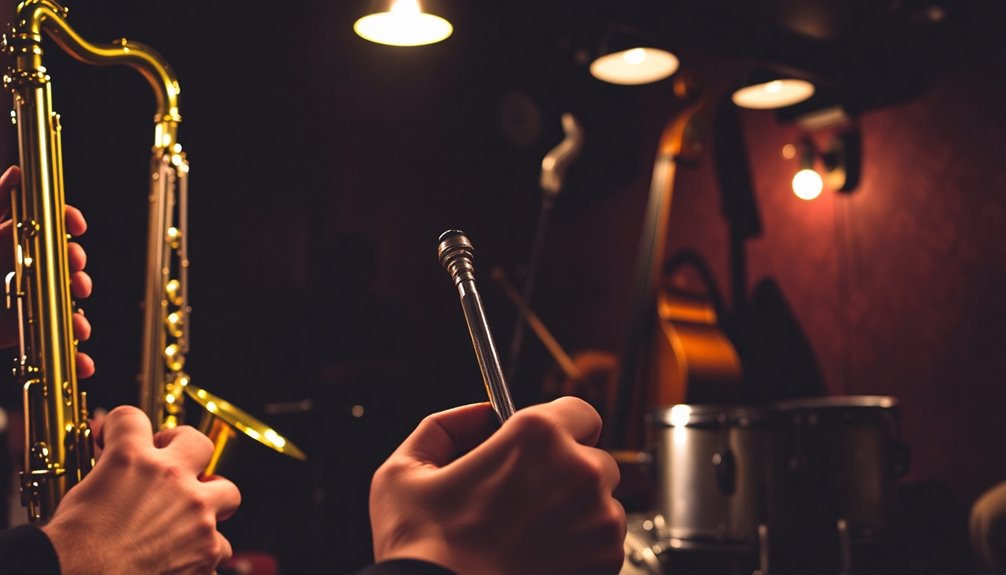
Versatile instruments are often the backbone of a jazz musician's toolkit, allowing for a dynamic range of expression and adaptability. When you think about it, the ability to shift styles and techniques can elevate your performance, making it more engaging for both you and your audience.
Take the flute, for instance; its versatility shines through in the way it can traverse genres from classical to jazz effortlessly. You can play smooth, melodic lines one moment and then plunge into intricate improvisations the next, showcasing its instrument adaptability.
As a jazz musician, embracing versatile instruments means you're not just confined to one sound or style. You can experiment with various techniques, blending the airy, light tones of the flute with the vibrant, rhythmic elements of jazz. This adaptability allows you to connect with fellow musicians, fostering a sense of belonging within the jazz community.
When everyone can switch gears and experiment, it creates a shared space for creativity and collaboration.
Moreover, your choice of versatile instruments can influence your musical journey. They can encourage you to explore different musical landscapes, expanding your skill set and enriching your artistic voice. The concert flute is a perfect example of a versatile instrument that can thrive in both classical and jazz settings, offering a wide range of tones for performance.
Key Features for Jazz Flutes
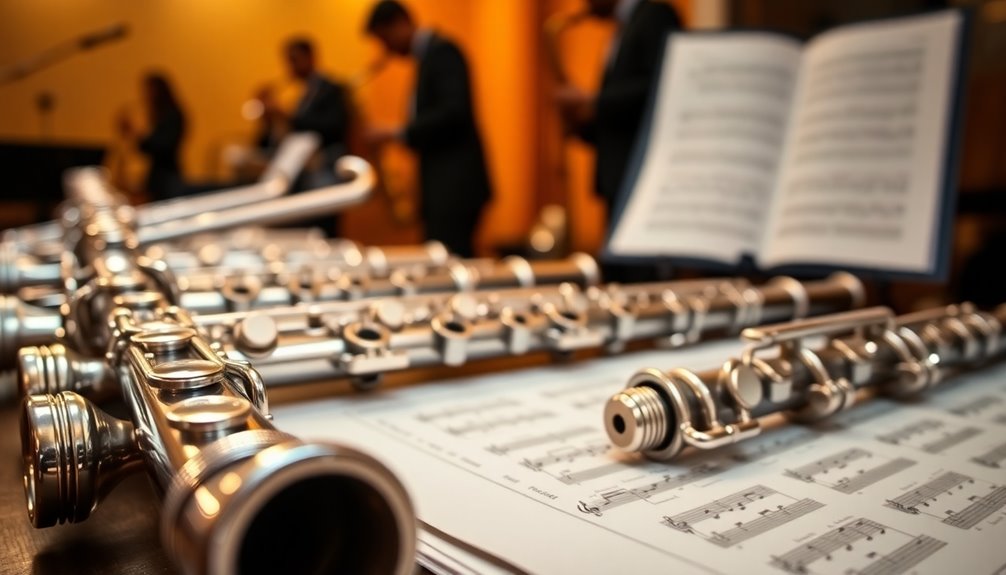
When selecting a flute for jazz performance, several key features can greatly enhance your playing experience. First, consider the flute's material. A silver or gold flute often offers a warmer, richer tone, which is essential for jazz improvisation. The choice of material affects not just the sound but also the responsiveness, allowing you to expressively execute various flute techniques.
Next, look at the key mechanism. A flute with a pointed key mechanism can provide you with a quicker response, facilitating smooth shifts between notes—crucial during fast-paced jazz solos. The addition of open holes can also enhance your control over dynamics and pitch, enabling you to add those subtle nuances that bring your improvisation to life.
Another significant feature is the lip plate design. A comfortable and ergonomic lip plate can make a world of difference during long jam sessions, ensuring you maintain a relaxed embouchure while maneuvering through complex passages. You'll want a flute that allows for easy articulation, so you can focus on your creativity rather than struggling with your instrument.
Finally, consider the flute's tuning. Jazz often involves bending notes and playing with microtonal adjustments. A flute that allows for precise tuning adjustments can be invaluable, making it easier to stay in sync with your ensemble. Additionally, many professional flute brands, such as Muramatsu and Haynes, are known for their superior craftsmanship, which can significantly enhance the overall sound quality of your jazz performance.
Top Flute Brands for Jazz
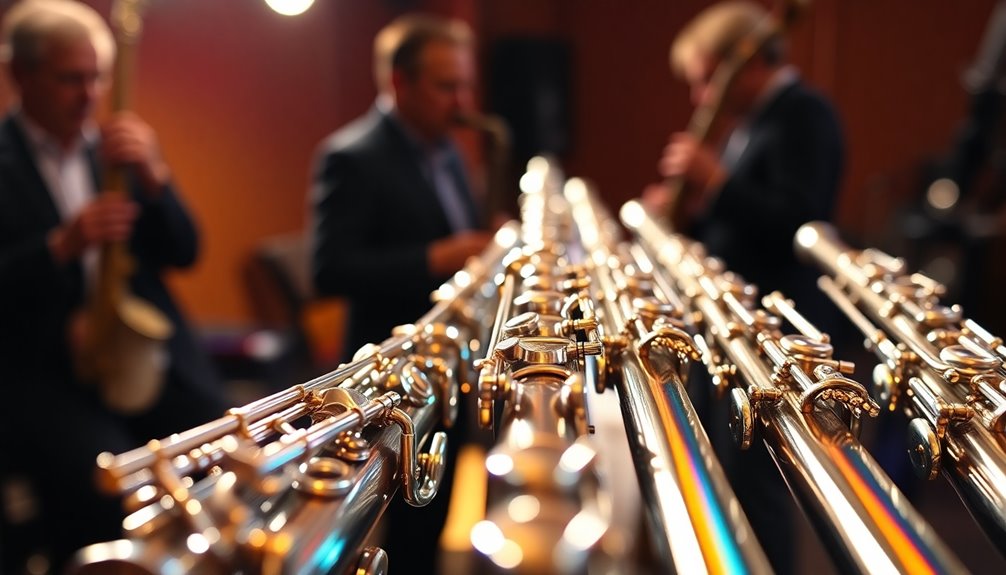
Finding the right flute brand can greatly impact your jazz performance, as each manufacturer brings its unique craftsmanship and sound qualities to the table. When diving into the world of jazz, you'll want to contemplate brands renowned for their rich flute history and commitment to excellence.
Yamaha, for instance, is often celebrated for its versatility and playability. Their flutes deliver a clear, resonant sound that complements various jazz styles. You'll find that Yamaha's instruments allow you to explore different flute techniques with ease, making them ideal for both beginners and seasoned players.
Another standout is Pearl, known for its innovative manufacturing process. Their flutes feature a warm, rich tone that can beautifully enhance your improvisational skills. With a Pearl flute, you can express yourself and connect with fellow musicians on a deeper level, fostering a sense of belonging within the jazz community.
Then there's Powell, which has been a favorite among professional flutists for generations. Their instruments are handcrafted, offering a unique sound that can elevate any performance. You'll appreciate the attention to detail and the ability to manipulate tone and dynamics, essential for jazz expression.
Lastly, contemplate the Selmer flutes, which are favored for their bright sound and responsiveness. They encourage exploration of advanced flute techniques, allowing you to push the boundaries of your musical creativity. Additionally, many of these brands offer affordable options for beginners that make it easier to start your jazz journey without breaking the bank.
Choosing the right brand can't only enhance your sound but also enrich your journey in the vibrant world of jazz.
Budget Considerations for Flutes
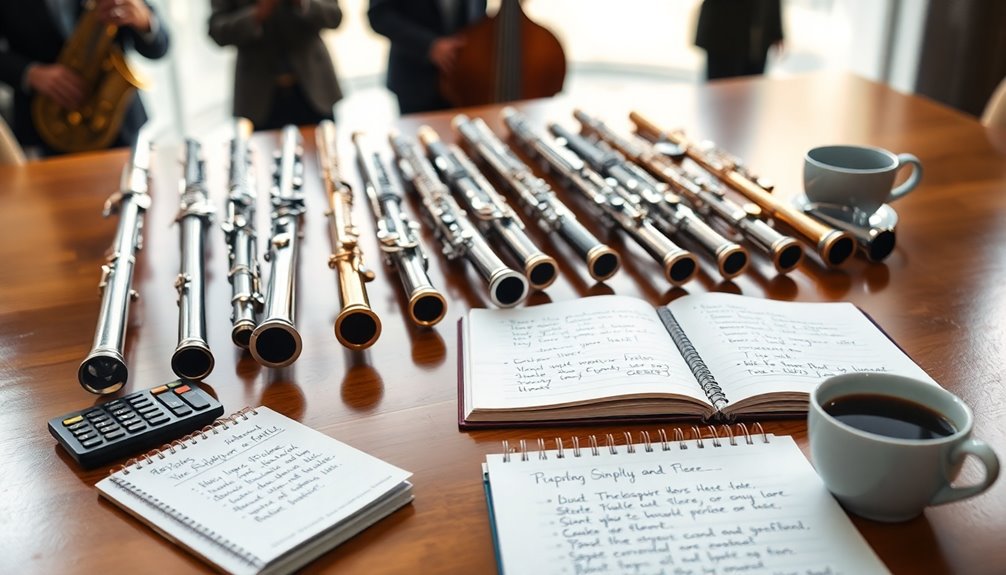
Choosing the right flute brand sets the stage for your jazz journey, but budget factors play a pivotal role in your decision-making process.
When you're looking to invest in a flute, it's crucial to balance quality with affordability. A well-chosen instrument can enhance your sound without draining your wallet.
Here are a few budget-friendly options to explore:
- Entry-level Flutes: These are typically manufactured with student musicians in mind. They offer decent sound quality at lower prices and are perfect for beginners or those on a tight budget.
- Used Flutes: Don't overlook the potential of a pre-owned instrument. Many flutes retain their quality over years, and buying used can save you a significant amount while still providing a great playing experience.
- Rent-to-Own Programs: Some music stores offer rental options, allowing you to use a flute for a specific period before committing to purchase. This way, you can test the waters and see if it's the right fit for you.
Additionally, consider affordable options for beginners that provide excellent sound without compromising on quality.
Beginner vs. Professional Flutes
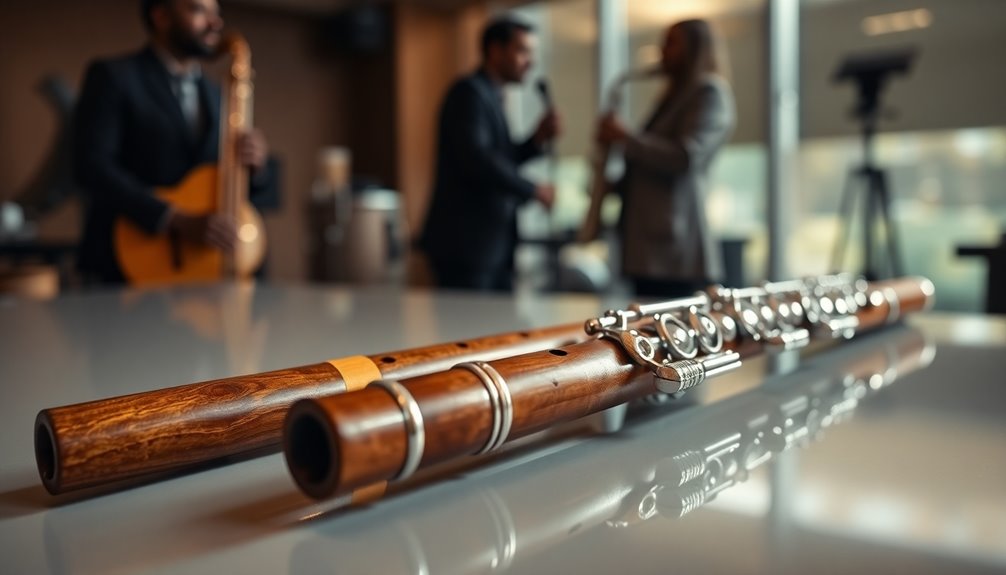
When you're starting out, beginner flutes are designed to be lightweight and easy to play, making them perfect for new musicians. They often feature simpler mechanisms, which help you focus on mastering basic techniques without overwhelming complexity. If you're just beginning your jazz journey, these flutes will support your learning process and allow you to experiment with different styles.
On the other hand, professional flutes offer more advanced features that can elevate your playing. They're crafted with superior materials and have a more refined sound quality, allowing for greater expression and nuance in your performances. If you're aiming to play in jazz ensembles or pursue more intricate solos, investing in a professional flute could be a game-changer. Their responsiveness can inspire you to explore new musical territories and achieve the level of artistry you desire. Additionally, considering the right material for your flute can significantly influence your overall sound and playing experience.
Ultimately, your choice depends on your current skill level and aspirations. If you're committed to growing as a musician and immersing yourself in jazz, a professional flute could be worth the investment.
However, if you're still figuring out your style, starting with a beginner flute might be best to build your confidence and foundational skills.
Maintenance Tips for Jazz Flutes
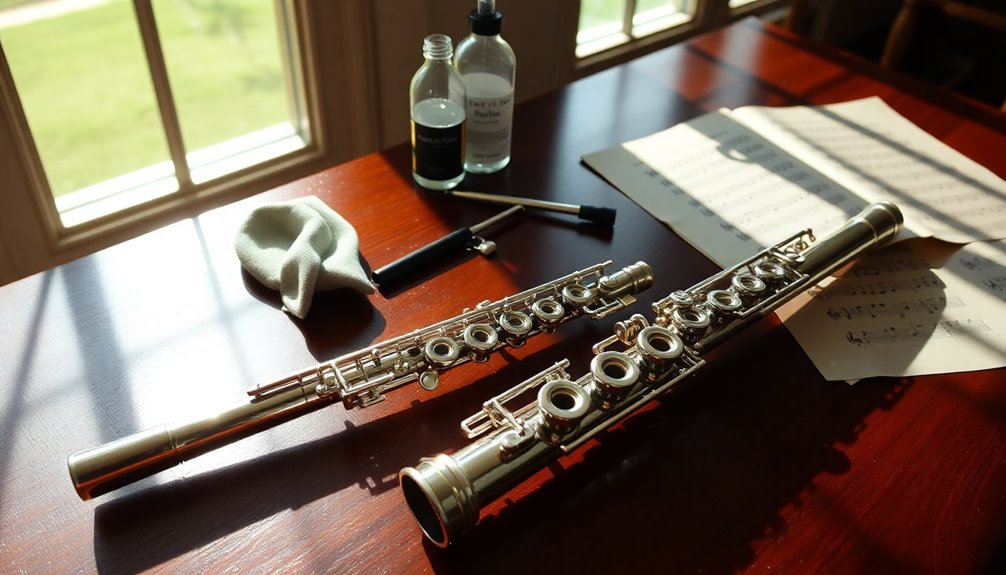
Regular maintenance is essential for keeping your jazz flute in top playing condition, guaranteeing it delivers the best sound possible during performances. By adopting effective cleaning techniques and focusing on pad care, you not only enhance the longevity of your instrument but also maintain its tone quality.
Here are some key tips to help you keep your flute in prime condition:
- Daily Cleaning: After each play session, use a cleaning rod with a soft cloth to wipe down the inside of the flute. This removes moisture and prevents buildup that can affect sound and mechanics.
- Weekly Inspection: Once a week, inspect the pads and keys for any signs of wear or moisture damage. If you notice any issues, it might be time to consult a professional for repairs or replacements.
- Proper Storage: When you're not playing, store your flute in a protective case. This keeps it safe from dust, dirt, and potential physical damage, guaranteeing it's ready to perform whenever you are.
Keeping up with these maintenance tasks will help you avoid larger repairs down the line. Additionally, utilizing a flute cleaning kit can aid in effectively removing dirt and moisture, further enhancing your instrument's performance.
Remember, your jazz flute isn't just an instrument; it's a partner in your musical journey. By investing time in its upkeep, you guarantee that it continues to produce the beautiful sounds that resonate with your audience and elevate your performances.
Sound Quality and Performance
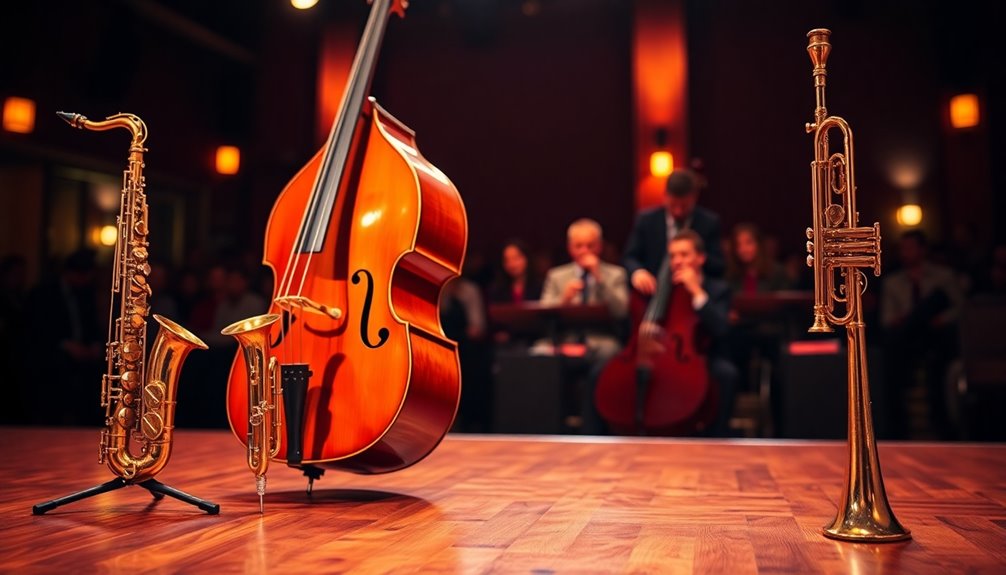
The vibrant sound of a jazz flute can transport listeners to another domain, but achieving that rich tone requires more than just skill—it's about the instrument's overall performance. When you choose a jazz flute, consider how its sound dynamics and tonal versatility will enhance your music. A well-crafted flute doesn't just produce sound; it allows you to express your creativity and connect with your audience on a deeper level.
Sound dynamics refer to the instrument's ability to produce varying volumes and intensities. A flute that excels in this area lets you shift seamlessly from soft, delicate notes to powerful, soaring melodies. This ability invites greater emotional expression in your playing.
Tonal versatility is equally essential, allowing you to explore different styles and genres within jazz. A versatile flute accommodates everything from smooth ballads to spirited bebop, making it a reliable companion for any performance.
Here's a quick overview of how different features impact sound quality and performance:
| Feature | Impact on Performance |
|---|---|
| Material Quality | Affects resonance and warmth |
| Key Mechanism | Enhances playability and response |
| Design and Shape | Influences tonal projection |
In your journey as a jazz musician, selecting an instrument that offers exceptional sound quality and performance will not only elevate your playing but also enrich the entire experience for both you and your audience. Embrace the possibilities! Additionally, consider how material quality and safety can enhance your flute's durability and overall sound experience.
Recommendations for Jazz Flute Models
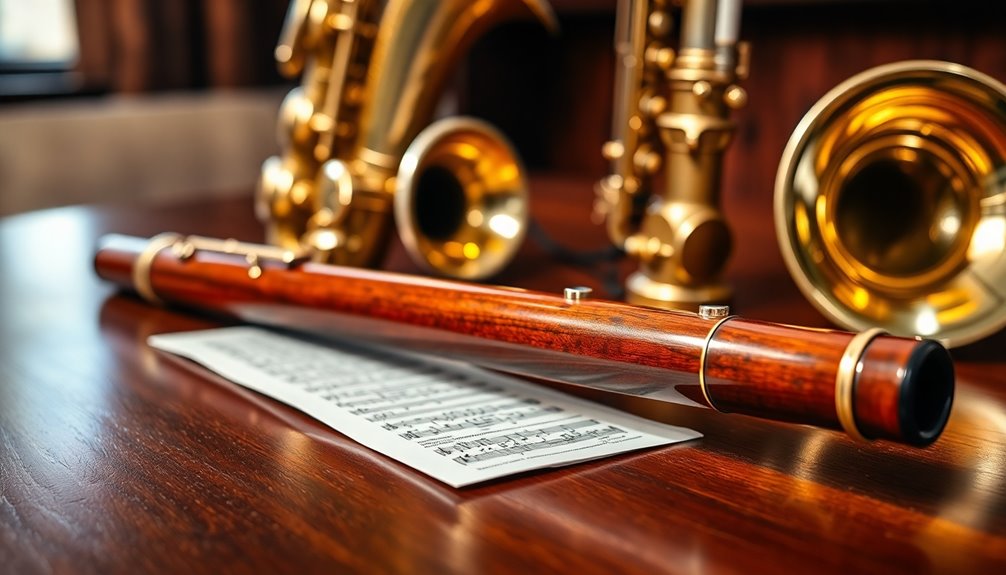
When it comes to selecting the right jazz flute model, your choice can greatly impact your playing experience and sound quality. The flute you choose shouldn't only resonate with your personal style but also enhance your ability to execute various flute techniques and engage in jazz improvisation.
Here are a few recommendations that can guide you towards a model that fits your needs:
- Yamaha YFL-577: This intermediate flute offers a rich tone and excellent intonation, making it ideal for both classical and jazz settings. Its silver headjoint provides a warm sound that complements improvisational styles.
- Powell Signature Flute: Renowned for its craftsmanship, this flute is perfect for advanced players looking to explore complex jazz passages. The combination of materials used gives it a unique voice, allowing for expressive playing.
- Pearl Quantz Series: This model is known for its durability and versatility. It's particularly suited for those who want to experiment with extended techniques often used in jazz. With its responsive keys, you'll find it easy to navigate through fast passages and intricate melodies.
In addition, many online retailers offer a variety of best student flutes, ensuring you can find the right fit for your musical journey.
As you immerse yourself in the world of jazz, remember that the right instrument can make a significant difference in your ability to express yourself musically.
Each model brings something distinctive to the table, so take the time to explore and discover what resonates with your jazz journey.
The Role of Flute in Jazz

Although often overshadowed by other instruments in jazz ensembles, the flute plays an essential role in shaping the genre's sound and texture. Its light, airy tone contrasts beautifully with the more robust sounds of brass and strings, providing a revitalizing layer to jazz composition. You might find that the flute brings a unique voice, capable of soaring melodies and intricate runs that can captivate any audience.
When you immerse yourself in flute improvisation, you'll discover a world of creative possibilities. The flute's agility allows for rapid-fire phrases and delicate trills, enabling you to explore complex harmonies and rhythms. This flexibility encourages spontaneous exploration, a key aspect of jazz that invites you to express your individuality while connecting with fellow musicians.
The interplay between flute and other instruments creates a rich tapestry of sound, inviting listeners into a vibrant musical conversation.
Moreover, the flute's versatility in jazz composition can't be understated. It can seamlessly shift from soft, lyrical passages to bold, fiery solos, reflecting the emotional depth that jazz embodies. This adaptability makes it a valuable addition to any ensemble, bridging the gap between different musical styles and enhancing the overall experience. Additionally, the flute is well-suited for jazz fusion, blending traditional jazz with rock, funk, and world music influences.
Frequently Asked Questions
What Styles of Jazz Are Best Suited for Flutes?
When you consider flute genres in jazz, you'll find that smooth jazz and bebop really shine.
The flute's light, airy tones complement the intricate melodies and improvisational elements in these styles. You can experiment with jazz techniques like flutter-tonguing and extended range to add depth to your sound.
Embracing these styles not only enhances your skills but also connects you to a vibrant community of musicians who share your passion.
How Do I Choose a Flute for Improvisation?
When you're choosing a flute for improvisation, consider reputable flute brands like Yamaha or Gemeinhardt, known for their quality and playability.
Look for a model that offers a warm tone and responsive keys, enhancing your improvisation techniques.
Test different flutes to find one that feels comfortable and suits your style.
Remember, the right flute can inspire creativity, allowing you to express yourself freely in any musical setting.
Trust your instincts and enjoy the journey!
Can I Use a Regular Flute for Jazz Music?
Yes, you can definitely use a regular flute for jazz music.
Its versatility allows you to explore various jazz flute techniques, like bending notes and improvisation.
While some may prefer specialized flutes, your regular flute can still produce rich, expressive sounds.
Embrace its unique voice, and don't hesitate to experiment with different styles.
You'll find that your creativity can shine through, making your jazz experience both personal and fulfilling.
What Accessories Are Essential for Jazz Flute Players?
When you immerse yourself in jazz flute, coincidence often leads you to discover essential accessories. A sturdy flute case protects your instrument, while cleaning supplies guarantee proper flute maintenance.
Consider a metronome to sharpen your jazz performance techniques; it keeps your timing tight. A quality music stand holds your charts, making it easier to focus on playing.
Each accessory complements your journey, helping you feel connected to the vibrant jazz community you're a part of.
How Important Is the Flute's Key Mechanism for Jazz?
The flute's key mechanism plays an essential role in your jazz expression. It directly influences your ability to execute intricate melodies and dynamic techniques.
Well-designed flute mechanics allow for smoother shifts between notes, enhancing your improvisation skills. If you can't easily maneuver the keys, you'll struggle to capture the essence of jazz.
Investing in a quality flute with responsive mechanics lets you fully explore the genre's rich emotional depth and technical demands.
Conclusion
In the world of jazz, choosing the right flute can truly make or break your sound. By focusing on versatility, sound quality, and the right model for your level, you'll set yourself up for success. Remember, the right instrument is like finding the perfect dance partner; it enhances your every move. So, immerse yourself in the brands and features that suit your style, and watch your jazz skills soar to new heights. Happy playing!

